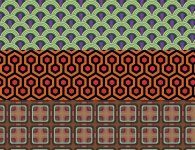You are using an out of date browser. It may not display this or other websites correctly.
You should upgrade or use an alternative browser.
You should upgrade or use an alternative browser.
THE GRID
- Thread starter sus
- Start date
sus
Moderator
One thing I always notice in the Mediterranean
Old stone in gridded walls and tiled floors
Green tendrils in the cracks between the blocks
This idea of vegetal interstice shows up in the folkwisdom of concrete cracks. Pedestrian pavement often has little grooves or breaks in it which make it appear to be a series of blocks or stones. But that is to prevent the spreading of cracks I assume, from.expansion/contraction
Old stone in gridded walls and tiled floors
Green tendrils in the cracks between the blocks
This idea of vegetal interstice shows up in the folkwisdom of concrete cracks. Pedestrian pavement often has little grooves or breaks in it which make it appear to be a series of blocks or stones. But that is to prevent the spreading of cracks I assume, from.expansion/contraction
version
Well-known member
Have you seen a film called Cube?

 letterboxd.com
letterboxd.com

Cube (1997)
A group of strangers find themselves trapped in a maze-like prison. It soon becomes clear that each of them possesses the peculiar skills necessary to escape, if they don't wind up dead first.
version
Well-known member
No should I?
Not sure. Been like fifteen years since I've seen it and can't remember if it's any good.
line b
Well-known member
It's greatNo should I?
sus
Moderator
Since you are now Chicago's leading Wake scholar, what do you think the Wake has to say about grids and schemas?It's great
GhostofKinski
Well-known member
Fractals
version
Well-known member
From a man who wrote about longitude/latitude lines, nonetheless
It's one of his major themes, that line-drawing impulse. It's at its most literal in Mason & Dixon with the surveyors structuring the American wilderness, but it appears in pretty much everything he's written. The way he discusses the internet in Bleeding Edge is essentially the same. It's a site of potential at the point it starts to become locked down like everywhere else, the usual forces moving in, staking out property lines, corralling the occupants. The point at which the grid comes down.
The people who claim he's emotionless or the books are too cold or too wacky seem to miss how sad that aspect of them is. You get this mapping of the process over and over and from various perspectives. It's always this brief window where something might change for the better and people dare to hope in the face of this gargantuan machinery gobbling everything up.
He had that anarchist character describe a miracle as an intrusion of another world into this one way back in '66 when he published Lot 49 and that seems to have been what he's been chasing his entire career: another world, one without the grid.
@version a hundred frenchmen must have written about the grid, no?
Baudrillard is implicated by way of The Matrix
D&G come to mind before Baudrillard, all the stuff about 'flows' and BwOs and deterritorialization and reterritorialization. Basically the same kind of thing I've just described in Pynchon, but with fancier vocabulary. Baudrillard did say something similar to the miracle line though:
sus
Moderator
It's one of his major themes, that line-drawing impulse. It's at its most literal in Mason & Dixon with the surveyors structuring the American wilderness, but it appears in pretty much everything he's written. The way he discusses the internet in Bleeding Edge is essentially the same. It's a site of potential at the point it starts to become locked down like everywhere else, the usual forces moving in, staking out property lines, corralling the occupants. The point at which the grid comes down.
Yeah I really wanna read M&D
I imagine that "the point at which the grid comes down" is also part of why he likes Westerns and in particular, Hall's Warlock.
How is Law established how does blood back up ink, how does force underly legal order.
sus
Moderator
This is identical to what Malick calls (a moment of) grace.He had that anarchist chararcter describe a miracle as an intrusion of another world into this one way back in '66 when he published Lot 49
version
Well-known member
Yeah I really wanna read M&D
I imagine that "the point at which the grid comes down" is also part of why he likes Westerns and in particular, Hall's Warlock.
How is Law established how does blood back up ink, how does force underly legal order.
It seems distinctly American. That sense of perpetually chasing a rapidly disappearing frontier, trying to reach escape velocity.
sus
Moderator
It seems distinctly American. That sense of perpetually chasing a rapidly disappearing frontier, trying to reach escape velocity.

